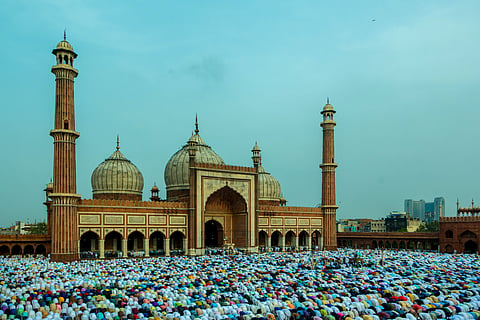
- Destinations
- Experiences
- Stay
- What's new
- Celebrating People
- Responsible Tourism
- CampaignsCampaigns
- SubscribeSubscribe
- Buy Now

The long holy month of Ramadan is about to come to an end, and the auspicious occasion of Eid is just around the corner. It is one of the two main festivals in Islam, the other being Eid al-Adha. Eid al-Fitr is celebrated on the first day of Shawwal, the tenth month of the Islamic calendar. Across the globe, Muslims observe Eid al-Fitr with various traditions and customs that reflect their cultural heritage. We have curated a list of the most sensational celebrations from different parts of the world where the uniqueness of the region is seen within the traditional and cultural observation on the day of Eid.
In Morocco, Eid al-Fitr, or "Eid Sghir" or "Small Eid," is when families come together to bond, exhibit generosity, and reflect spiritually. The celebrations commence with families waking up before dawn for the special Eid prayer, "Salat al-Eid." This prayer is held in mosques, prayer grounds, and outdoor spaces. After the prayer, Muslims wish each other "Eid Mubarak" and exchange hugs, gifts, and sweets. One of the special traditions of Eid in Morocco is the preparation of festive dishes such as "msemmen," a type of flaky pancake, and "sellou," a sweet, nutty confection. These delicacies are enjoyed by families who gather together to share communal meals, reinforcing their kinship and solidarity.
Celebrations also include acts of charity towards those in need. Families distribute alms and food to ensure everyone can join the joyous occasion. Traditional Moroccan attire, including the iconic djellaba and kaftan, adds to the festive atmosphere, with vibrant colours and intricate designs symbolising the diversity and richness of Moroccan culture. Beyond the festivities, Eid al-Fitr in Morocco is also a time of spiritual renewal and gratitude. Muslims reflect on the blessings of Ramadan and seek forgiveness for past transgressions. It is a moment to reaffirm faith, strengthen community ties, and spread joy and compassion to all.
In Egypt, Eid is celebrated with great enthusiasm, and the streets are adorned with vibrant decorations. People enjoy watching fireworks and traditional folk dances. It is advised to eat before going out for Eid prayer as a symbol that the fasting period is over because it is forbidden to fast on the first day of Eid al-Fitr. Men tend to eat three dates before they head out to their mosques for the Eid prayer. Families gather to relish lavish feasts featuring iconic dishes such as "fatta" and "koshari". Children receive gifts and toys, and mosques host special prayers and sermons highlighting the importance of unity and solidarity within the community.
In Turkey, the celebration of Eid is known as Şeker Bayramı, which translates to "Sugar Feast" and lasts for 3 days. This name is derived from the sweet delicacies that are an essential part of the festivities. On this day, Turkish people start by washing and wearing new clothes and then visit their elders to ask for their blessings and forgiveness. On the day of Eid, it is customary for Muslims to attend a special prayer in the morning. While men must attend, some women also participate. After the prayer, family members uniquely exchange greetings by kissing each other's hands. The younger person kisses the elder's right hand before touching it to their own forehead as a sign of respect. Children receive sweets and money from their elders. People pay short visits to each others' homes and are always greeted with eau de cologne during Eid, a regular custom for welcoming guests in Türkiye. Traditional Turkish dishes such as halva are also prepared. The celebration of Eid in Turkey is a combination of Islamic traditions and Anatolian culture. Families visit the graves of their loved ones, share meals with their neighbours, and distribute sweets like "baklava" and "lokum." Prayers and sermons are held in Turkish mosques, emphasising the importance of community bonding.
In Indonesia, the world's largest Muslim-majority country, Eid, known as "Lebaran," is marked by a mass exodus of urban dwellers returning to their hometowns. This departure is known as "Mudik." The streets are adorned with lights and decorations, while markets offer traditional snacks. People in their homes prepare savouries like "ketupat" and "opor ayam" along with cookies like "kastenger" and "nastar" (buttery cookies with pineapple jam fillings). On the first morning of Eid, folks wear their fine new clothes and begin their day with prayers at the mosque. After the prayers, they follow the long tradition of "Sungkeman," seeking forgiveness from parents, siblings and other close ones. Following this, they indulge in "Halal Bihalal," which is simply gathering, a tradition that involves visiting the elders of the family, friends, and colleagues. The regions of Yogyakarta and Surakarta are known for their Palace celebrations, which include a torch parade. In other areas like Semarang, Demak, and Surabaya, the parade involves the recitation of Takbir, accompanied by the sound of rabbana, drums, and kenthong (a bamboo percussion instrument). Garebeg Syawal is held on the evening before Eid Day.
Eid is a significant event in the UAE, where families celebrate the end of Ramadan by gathering for communal prayers, exchanging gifts, sharing meals, and taking part in public festivities. Charity is an essential part of the celebration, and traditional Emirati dishes are served in elaborate feasts. The streets are adorned with lights and decorations, while malls host events and sales.
